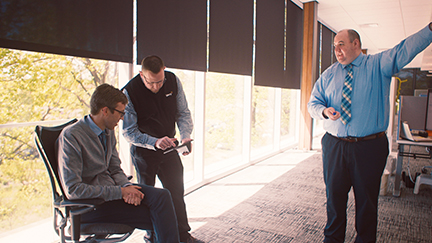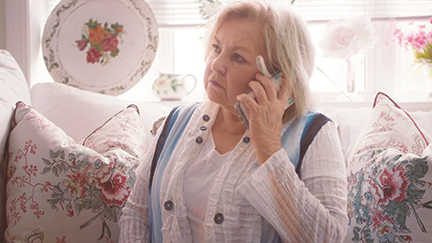ACHIEVEMENT CITATION
When Mercy launched COVID Care @ Home early in the pandemic, the focus was on connecting patients who had tested positive for the virus with medical care providers 24/7 by text, video and phone as they recovered at home.

It wasn't long before Mercy chaplains asked if they could offer emotional support and spiritual care services to those patients. "I think we encountered a lot of our at-home patients dealing with the uncertainty that we were all facing, of not knowing what the disease was or how it would affect us personally or communally," says Justin Martin, a board-certified chaplain who is part of Mercy Virtual, the Chesterfield, Missouri-based system's virtual hospital and telehealth center.
Most of the at-home patients, Martin notes, were quarantined alone or in spaces separate from others in their families. "That brought on a lot of emotional and spiritual distress," he says.
Mercy tapped Martin and Cody Alley, a board-certified chaplain and spiritual care supervisor based at Mercy Hospital Lebanon in Southwestern Missouri, to come up with a way to add spiritual care to COVID Care @ Home. The two consulted with physicians and leaders within Mercy Virtual to figure out how to identify patients desiring the care and how the health system could process referrals for the care.
Spiritual 911
By September 2020, with the support of Mercy's technology services team, the two chaplains had developed and begun using a screening tool delivered through a series of short text messages.
Within two years, more than 240,000 patients across Mercy's service areas in Missouri, Arkansas, Kansas, Oklahoma, Louisiana, Mississippi and Texas had undergone the screenings and about 16% of them had self-reported distress. Mercy asked those patients if they'd like to speak with a Mercy chaplain by phone. About 2,000 patients said yes.
Chaplains from across Mercy call COVID Care @ Home patients who request spiritual care. Their role, Martin says, is "being present and journeying alongside those patients, providing them encouragement and support, and helping them connect back to what is meaningful for them as they make sense of their illness."
For its innovative approach to detecting spiritual distress among COVID patients who are getting virtual care and linking them to chaplains, the Mercy COVID Care @ Home Spiritual Care program is the 2023 recipient of CHA's highest annual honor —the Achievement Citation. CHA presented the award during the Catholic Health Assembly, which the association held virtually this year.
'Somebody in the God space'
Steve Mackin, president and chief executive of Mercy, says the system "is always focused on finding innovative, new ways to holistically address the needs of all our communities."
Mackin says the COVID Care @ Home Spiritual Care program uncovered and met a deep need from one patient group for chaplaincy services. "This program had such a profound effect that it is still in place," he says. Mackin notes that the program is "fully mirroring the way we think about providing care today."

Chaplain Martin says virtual spiritual care is "living into our Catholic identity and mission."
Dianne Elliott, who resides in suburban St. Louis, took advantage of Mercy's offer of spiritual care when she contracted COVID earlier this year and isolated at home, away from a family that stretches to nine great-grandchildren. "It was really a lonely 14 days and it's scary," Elliott says.
She credits the outreach from Mercy chaplains with helping her manage her anxiety and cope with the isolation. The chaplains not only prayed with her, Elliott says, they asked her about her life and counseled her to be good to herself.
Elliott says that while the pastor and congregation at her nondenominational Christian church also were praying for her, she got added peace of mind from her conversations with the Mercy chaplains. "That made it easier for me and made me more relaxed because I had somebody in the God space that was encouraging me and praying with me that didn't even know me," she recalls.
Elliott says she found Mercy's holistic care during her COVID convalescence to be uplifting. "They wanted to make sure I was OK in every area," she adds.
Four questions
Mercy's virtual spiritual care screenings are a series of questions posed by text. The questions go out twice, on patients' second and ninth days of the 14-day COVID Care @ Home program.
The first question asks patients if they are feeling decreased joy, purpose and meaning in their lives. The second question asks whether they feel disconnected from their religious tradition or from other people. The third asks if they are feeling grief or loss.
Martin says that patients can opt out of the screenings at any time by texting back that they want to disenroll or by answering no to the questions. Patients who opt out get a final text letting them know that if they have a change of heart, Mercy's e-Chaplain services, which come via email, are available at any time.
If patients answer in the affirmative to any of the first three screening questions, they get a text asking if they would like to speak by phone with a chaplain. Mercy added that fourth question after the screenings were underway, when it became clear that some patients who indicated distress didn't necessarily want to talk about it when a chaplain called.
Alley says some patients have told the chaplains that, though they hadn't realized before their screening that they were experiencing distress, they preferred to deal with it themselves, with family or through another means of support.
Needles in the haystack
Through the questions, Alley says, Mercy identifies those in the COVID Care @ Home program open to spiritual care and who would like a Mercy chaplain to provide it. "This screening has helped
us go from trying to find a needle in the haystack to somebody bringing a box of needles, sitting it on our desk and saying, 'Here they are,'" he says.
The services the chaplains provide in their calls to the patients vary, Martin and Alley say. Sometimes, the chaplains serve as a sounding board as patients talk about the causes of their distress. Sometimes they join the patients in prayer. Occasionally, the chaplains will serve as a bridge between patients and faith communities from which the patients have become estranged or between patients and social service agencies.
Martin recalls one chaplain who, after hearing that a patient had lost his job and was on the verge of becoming homeless, connected the patient with a Mercy community health worker. That worker helped the patient find supportive community services.
"By asking the spiritual and emotional questions, we as the ministry were able to identify that need for that patient and connect them to other resources that we have to get some of those needs met," Martin says.
More touch points
Mercy says the spiritual care screening program required about $5,000 in startup funding, mostly to cover the labor expense for the technology build. Mercy sustains the program operationally through
existing budgets, the services of two full-time virtual chaplains, and when needed, the support of 10 inpatient care chaplains.
Because of the success of the screenings, Mercy has begun to expand them beyond COVID Care @ Home. Mercy is piloting the use of the screening tool to assess palliative care patients and women's health patients for emotional and spiritual care needs.
Alley says the expansion of the screenings gets Mercy closer to its goal of making all of its services, including spiritual care, available to patients wherever they are and whenever they need them.
Sharon Millsap was a Mercy COVID Care @ Home patient just after the first of the year. She welcomed the spiritual care calls and credits Mercy's holistic care for helping her to shake symptoms that lingered long after she was clear of the virus. "The COVID just threw me into a whole fog, and I was so depressed, and so hopeless and despairing and fatigued," says Millsap, a retired nurse who lives in St. Louis.
She says it took until late April before those symptoms went away. Of Martin, she says: "He kept me going. And it worked."
